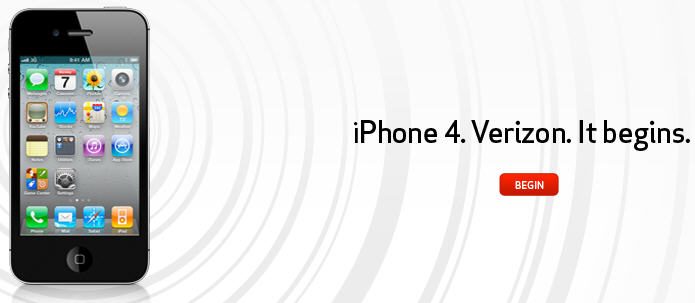
Graphic on Verizon Wireless Website celebrates the Verizon iPhone (Credit: Verizon wireless)
The rumors are true. Verizon will start shipping an iPhone on February 10th. Pre-orders will be accepted starting on February 3rd. Verizon has a web page where “You can sign-up to get details” on how to be one of the first to get iPhone 4 on Verizon.”
The phone will cost $199 for a 16 GB model with a 2-year contract. $299 will get you a 32 GB phone.
With a few exceptions, the Verizon iPhone will be same as the AT&T model. It will have FaceTime, HD video, Apple’s A4 chip, a 3-axis gyro, the cool Retina display, a 5 megapixel camera and the same general design.
WiFi Hotspot and Other Differences Between Verizon & AT&T iPhones
There were very few surprises at the announcement but, unlike the AT&T version, the Verizon iPhone will allow you to create a mobile WiFi hotspot that can support up to 5 devices. Verizon didn’t say whether there will be an extra charge for the hotspot service, although there likely will be. I have this feature in my HTC Evo Android phone from Sprint and use it often. I’ve filed radio reports from the back of taxi cabs and use it routinely in hotels to avoid paying $10 to $15 for the hotel’s WiFi service.
A difference in AT&T’s favor is that AT&T’s GSM network can support simultaneous voice and data so it’s possible to talk on the phone and download email or view a map. That’s not the case with Verizon’s CDMA technology used by Verizon though that will change over time.
Also, AT&T’s GSM network can be used in Europe and most other parts of the world. Verizon’s CDMA network can be used in the U.S., Canada, Mexico and a limited number of other countries.
Does not Support 4G LTE Network
Verizon and Apple confirmed that the new phone does not work on Verizon’s new and faster LTE (Long Term Evolution) network so it will not be as fast as some competing “4G” phones including several Android models. The AT&T iPhone also runs on its 3G network and not the company’s faster 4G network.
At the press conference, Verizon claimed that its network is “robust” enough to handle the iPhone. Verizon does have a great deal of experience with Android phones that make similar data demands on the network.

Verizon iPhone 4 view from the side (Credit: Verizon Wireless)
Analysis
Normally the news of a phone being picked up by another carrier barely makes the trades let alone mainstream media. But this isn’t any phone and Apple isn’t any company. The iPhone redefined the smart phone when it was introduced 3 ½ years ago and despite some excellent competition; it still dominates mindshare, if not market share of new purchases.
With the exception of the WiFi hotspot, there is nothing new about the Verizon iPhone except that it runs on the Verizon network which is good news to people who hate AT&T, who can’t get a decent AT&T signal where they are or who are locked into a Verizon contract and don’t want to switch.
Still, it’s not as if the iPhone is the only cool phone on the market. I’ve used all the iPhones along with Android phones running on AT&T, Sprint, Verizon and T-Mobile as well as various flavors of Blackberries and other phones. The iPhone’s IOS operating system, which is now a third of a decade old, is definitely more stable and less prone to crash than Android but it’s certainly not way ahead in features. In fact, Android phones have some features that iPhone users don’t have including arguably better multi-tasking, better integration with Gmail and Google calendar, a more robust version of Google Maps and a removable battery which can be a big plus. There are some Android phones that run on faster 4G networks and it also has an open marketplace which makes it easier for developers to create apps and get them to market (though it also makes it easier for malware to show up on the phone). And Google is constantly upgrading Android.
Even Windows Phone 7 – which is barely making an impact so far – has some great features not available on the iPhone including a very innovative user interface that makes it easier to keep up with your friends and colleagues.
Still, Apple seems to have a magic wand which it just waved at Verizon. That’s good news for Verizon and Apple, good news to people who have been waiting for an iPhone running on something other than the AT&T network and good news for existing AT&T customers who want to hang up on AT&T and say Hello to Verizon.

Larry Magid is a technology journalist and an Internet safety advocate. He serves as on-air technology analyst for CBS News, is co-director of ConnectSafely.org and founder of SafeKids.com and SafeTeens.com. He also writes columns that appear on CNET News, CBSNews.com, Huffington Post and the San Jose Mercury News.
His technology reports can be heard daily on CBS News and CBS affiliates throughout the U.S. and he has a daily tech segment on KCBS radio in San Francisco. He’s a regular contributor to BBC World Service and an occasional guest on National Public Radio’s Talk of the Nation. He is often called upon for commentary by CBS television news, CNN and Fox News and has appeared on the CBS Evening News, ABC World News Tonight, the Today Show and CBS Early Show. He has also been a frequent contributor to the New York Times and was, for 18 years, a syndicated columnist for the Los Angeles Times.
He has written several books including the best-selling Little PC Book and is co-author (with Anne Collier) of MySpace Unraveled.
Larry served on the Obama Administration’s Online Technology Working Group and the Berkman Center’s Internet Safety Technology Task Force.








